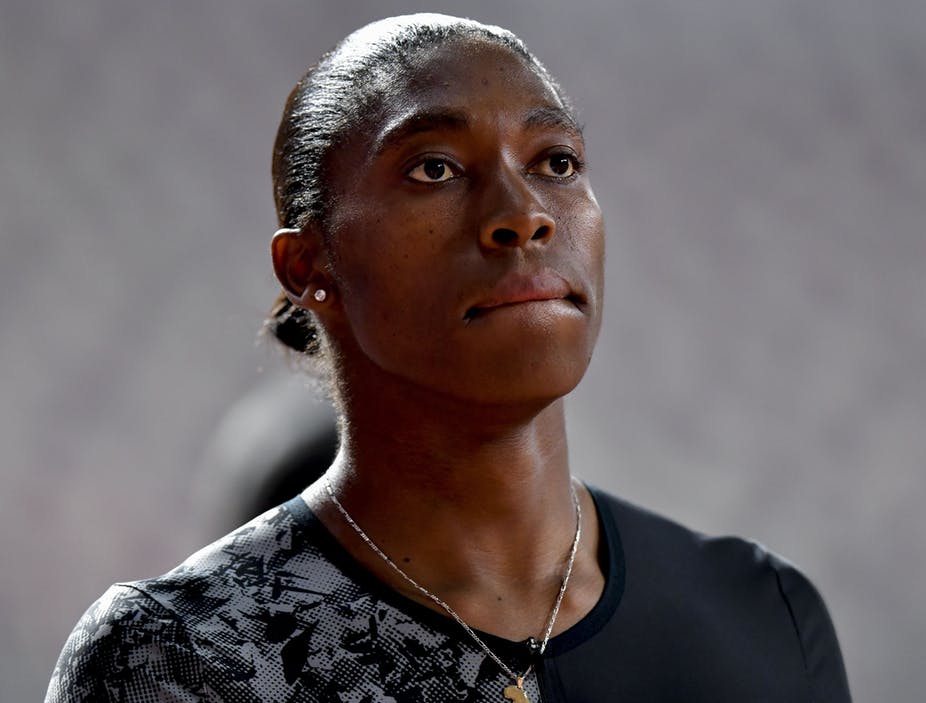Caster Semenya: The Legal and Ethical Issues That Should Concern Us All
AFRICA, HEALTH, JUSTICE, SPORTS, SEXUALITIES, SCIENCE, 3 Jun 2019
Steve Cornelius – The Conversation

Caster Semenya at the IAAF Diamond League athletics meeting in Doha, Qatar, 03 May 2019. Noushad Thekkayil/EPA
27 May 2019 – Early last year the International Association of Athletics Federations (IAAF) introduced regulations requiring South African 800m Olympic champion Caster Semenya – and other middle distance runners with differences of sex development – to lower their naturally high levels of testosterone.
In February 2019 Semenya’s legal team argued that the policy was invalid. But in May the Court of Arbitration for Sport ruled that discrimination in sport is legal provided it is justified.
The way in which the IAAF has gone about dealing with Semenya raises serious legal and ethical concerns. And Semenya isn’t the only athlete involved. This is an issue that goes beyond just the difference of sex development. It goes to the fundamental root of human dignity, of privacy of every athlete who participates at the World Championships.
There are ethical concerns about the way in which the research was conducted that led to the decision. The legal concerns revolve around serious fundamental rights concerns, in particular in the way a number of female athletes have been treated.
In a paper I wrote two years ago – “You can play as long as you don’t win: Legal perspectives on the regulations pertaining to the participation of women with hyperandrogenism in women’s athletics” – I explored the big ethical and legal problems I believe are involved in Semenya’s case, as well as those of dozens of other women.
My view is that some women are being singled out because they are different. If Semenya looked different, if she was a blonde bombshell or if she didn’t win, we wouldn’t be having this debate today.
My big concern is that if this ruling by the Court for Arbitration in Sport remains unchallenged, this way of thinking and behaving might filter into the International Olympic Committee, the overarching body that regulates sport. That, in turn, will affect all its affiliations. These include the national Olympic committees and international federations like the IAAF and Fifa and the national associations under them.
That’s fundamentally wrong.
The ethics question
The first problem lies in the way in which the World Anti-Doping Authority has behaved. The World Anti-Doping Authority and national anti-doping authorities – which operate parallel to the other sporting bodies – are supposed to be independent. The World Anti-Doping Authority should be a completely separate, independent body that checks on the sports federations to ensure they enforce anti-doping measures uniformly and in a correct manner.
In reality, this isn’t the case.
This is how it works. At an event like the World Athletic Championships, it will be responsible for conducting the anti-doping tests. It will set up its own anti-doping control stations; collect the samples.
As part of the process athletes who enter agreements to participate in World Athletic Championships will also give consent to the World Anti-Doping Authority to conduct these tests. Part of that consent is also that the agency will, in terms of the rules, keep these samples for up to 10 years. They can re-test later for substances but they can also conduct research on anti-doping matters.
That’s important.
What happened in practice was that in 2011 and 2013 the IAAF instructed athletes to give both urine and blood samples. The reason given was that they were developing what is called a biological passport. This is an athlete’s biological profile that’s developed over a period of time. A sudden anomaly could indicate that there’s a doping or some other issue.
The problem is that IAAF passed these samples onto its medical team, the medical commission, which conducted its own research to determine the hormone levels of the athletes.
The argument being forwarded by the IAAF is that this is about doping. But the World Anti-Doping Agency ruled that the regulations on hyper-androgenism or difference of sex development have nothing to do with anti-doping.
This raises the question: if biological samples that have been collected for one purpose by one entity are passed onto another entity to do research for which consent has not been given, is this a lawful use of that sample?
The basis of modern ethical biological research and medical treatment is the Declaration of Helsinki. Though not an internationally legally binding document, it’s nevertheless set the standard for a lot of countries, including South Africa, that have developed their own biomedical laws.
In South Korea – where the tests took place – the Helsinki Declaration led to the adoption of the Bioethics and Safety Act. This states that to conduct any form of biomedical research you need the informed consent of the individuals. But none of the athletes – and I have spoken to a number who have participated at these championships – have been informed these samples could be used on hormone research.
Lots of countries have similar rules. For example Monaco, where the IAAF is based, has a strong requirement that there must be proper, informed consent.
One thing all of these laws have in common is that the consent can be withdrawn at any stage and there should be no penalty for that. And it’s a criminal offence if one does not obtain the proper, informed consent.
This issue has been raised repeatedly with the IAAF throughout the process. But to no avail.
I’m still to see that there is a single form or indication that any athlete has been properly informed of the nature of the research conducted, who will conduct the research, what the possible consequences are, what it means for the athlete and how their identity is being protected in the process.
The IAAF has not been able to produce any of this. And the Court of Arbitration for Sport dismissed these arguments and considered all the evidence that had been collected in spite of the lack of informed consent.
Human rights
The second major issue relates to massive human rights concerns.
The rights I’m referring to are set out in the European Convention on Human Rights, in particular Articles 2 and 8.
Let me begin with Article 8 which I believe should have been applied and was in fact raised before the court. It provides that everyone has the right to respect for private and family life. In the case of Solomakhin v Ukraine, for example, the European Court of Human Rights ruled that any compulsory medical intervention, even if it was of a minor importance, constituted an interference with this right.
Effectively coercing a healthy athlete into taking hormone treatment is certainly a compulsory medical intervention. They can argue that she has the choice. But there is no choice.
For its part, Article 2 of the European Convention on Human Rights and Biomedicine provides that the interest of welfare of each human being takes precedence over the interest of society.
Even the IAAF’s constitution, in article 3, gives a commitment to human rights with ethical values, while the Olympic Charter is against any form of discrimination and is for the promotion of women, equality of men and women, sport for all.
These have all been laid bare as empty promises.
_________________________________________
Steve Cornelius – Professor of Private Law, University of Pretoria
Republish our articles for free, online or in print, under Creative Commons license.
Go to Original – theconversation.com
Tags: Human Rights, Justice, Sports, Women Rights, World
DISCLAIMER: The statements, views and opinions expressed in pieces republished here are solely those of the authors and do not necessarily represent those of TMS. In accordance with title 17 U.S.C. section 107, this material is distributed without profit to those who have expressed a prior interest in receiving the included information for research and educational purposes. TMS has no affiliation whatsoever with the originator of this article nor is TMS endorsed or sponsored by the originator. “GO TO ORIGINAL” links are provided as a convenience to our readers and allow for verification of authenticity. However, as originating pages are often updated by their originating host sites, the versions posted may not match the versions our readers view when clicking the “GO TO ORIGINAL” links. This site contains copyrighted material the use of which has not always been specifically authorized by the copyright owner. We are making such material available in our efforts to advance understanding of environmental, political, human rights, economic, democracy, scientific, and social justice issues, etc. We believe this constitutes a ‘fair use’ of any such copyrighted material as provided for in section 107 of the US Copyright Law. In accordance with Title 17 U.S.C. Section 107, the material on this site is distributed without profit to those who have expressed a prior interest in receiving the included information for research and educational purposes. For more information go to: http://www.law.cornell.edu/uscode/17/107.shtml. If you wish to use copyrighted material from this site for purposes of your own that go beyond ‘fair use’, you must obtain permission from the copyright owner.
Read more
Click here to go to the current weekly digest or pick another article:
AFRICA:
- Teaching Peace: Nurturing Young Peacemakers in Ghana through Education
- War in Sudan: Nearly One Million People Forcibly Displaced to Chad
- Black Skin, White Masks: This Man Wanted to Cure the Disease of Colonialism
HEALTH:
- U.S. Terminates Funding for Polio, H.I.V., Malaria and Nutrition Programs Around the World
- Autism, Made in the USA
- Big Pharma Is a Big Menace to Global Health
JUSTICE:
- Statement of the ICC Office of the Prosecutor on the Arrest of Former Philippine President Rodrigo Roa Duterte
- Ireland Formally Joins ICJ Genocide Case against Israel
- Good and Bad War Criminals
SPORTS:
- Chess Prodigy at Three: He’s Internationally Ranked but Is Confused and Scared by the Limelight
- The Drama and Suffering of the World Chess Championship
- Chess King Gukesh: How an 18-Year-Old Indian Dreamer Checkmated the World
SEXUALITIES:
- After Their Son Came Out, This Conservative Christian Couple Went into a Closet of Their Own
- Brilliant New Film ‘Pray Away’ Picks Personal Stories of ‘Ex-Ex-Gays’ to Expose Faith-Based Conversion Therapy as a Religious Sham
- Pope Francis Calls for Creation of Civil Union Laws for Same-Sex Couples
SCIENCE:
